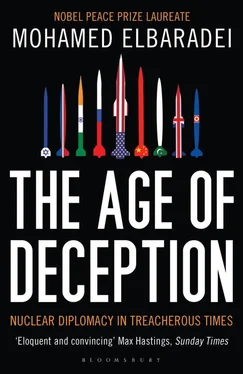On February 23, I returned to Tripoli for an update. The hotel where I stayed was abuzz with Western corporate types. The word was out: sanctions would soon be lifted and Libya was open for business. In particular, we noticed a glut of oil company representatives standing by, hoping to cut deals for access to Libya’s considerable natural resources. Listening to Libyan officials as they tried to cope with rapid changes on many fronts, I could not help feeling that they were in danger of being exploited.
“The problem,” Foreign Minister Shalgem told me, “is our lack of managers.” This was amply evident. Libya had been isolated for more than twenty years. A large number of their most talented people had left the country. Aside from a handful of Western-educated professionals, including some nuclear scientists, Libya had a very inexperienced bureaucracy.
Moussa Koussa, the head of intelligence, had spent time in the United States, earning a degree in sociology at the University of Michigan, where he had written a biography of Gaddafi as his master’s thesis. Shalgem, too, had lived abroad for many years as Libya’s ambassador to Italy. Both men had a good grasp of world affairs. We talked about the importance of learning to negotiate and get a fair price for Libya’s resources and assets. We also discussed their critical relations with other North African and Middle Eastern countries. Libya was getting a lot of criticism in the Arab world, perceived as “selling out” after thirty years of a so-called “revolutionary” stance on many issues. The Egyptians, in particular, were incensed that the Libyans had not told them about their WMD programs, nor about their negotiations with the Americans and the British. Just months earlier, President Mubarak had said in a public speech, “I know what Libya has and they have nothing in terms of weapons of mass destruction.” In hindsight, of course, his assertion was rather embarrassing.
The Libyans had sent Abdallah el-Senussi, the head of military intelligence and Gaddafi’s brother-in-law, to try to smooth things over with Mubarak. However, when criticism of Libya’s decision to give up their weapons program began appearing in the Egyptian media, Gaddafi retaliated by putting restrictions on Egyptian citizens crossing into Libya. This was harsh: there were roughly half a million Egyptians working in Libya. But the Egyptians did put a stop to their criticism and sent a group of cabinet ministers to Tripoli to appeal to Gaddafi to reverse his decision. It was easy to get the sense that relations between Egypt and Libya were often driven more by whims and power games than by rational planning.
Libyan officials were in turn very critical of the Egyptian government. Mubarak, they said, had grown too old to provide meaningful leadership, either in domestic policy or in the larger Arab world. “You know,” one official told me, “the Arab world cannot go anywhere without Egypt; if the Egyptians take the lead, everybody will follow.”
Libya’s efforts to maintain its standing in the Arab world were not helped by an exclusive media “show” staged by U.S. secretary of energy Spencer Abraham. I received a call about this on March 16 from Matouq. He was upset. Forty-five journalists had been flown in by chartered jet to the Y-12 National Security Complex in Oak Ridge, Tennessee. The subject of the media opportunity was a dramatic display of Libyan nuclear equipment. Abraham’s podium had been strategically placed in front of a collection of large shipping crates, some of them opened to display centrifuge components. He characterized the Libyan developments as a “big, big victory,” noting that the equipment on display was only “the tip of the iceberg.”
“By any objective measure,” Abraham announced, “the United States and the nations of the civilized world are safer as a result of these efforts to secure and remove Libya’s nuclear materials.” [7] Jody Warrick, “U.S. Displays Nuclear Parts Given by Libya,” Washington Post , March 16, 2004. I am often amazed, and saddened, by discriminatory statements like this, made by intelligent, well-educated U.S. politicians, implying that the “civilized world” includes only a certain special group of nations. By inference, I would assume this means that other countries are to be considered “uncivilized.”
Leaving aside the implied insult of Abraham’s reference to the “civilized world,” his assessment of the Libyan program was overblown. His claim that the Libyans had four thousand centrifuges was inaccurate, since the majority of the centrifuges were incomplete. Nonproliferation experts disputed the claims. David Albright at the Institute for Science and International Security issued a rebuttal, noting that the display had shown only centrifuge casings, without the rotors that would make them operational. “Make no mistake,” he said. “The Libyan program was very serious and we’re glad it’s stopped…. The problem, from our point of view, is that the White House, which basically organized the briefing, is so focused on claiming credit that it’s willing to exaggerate.” [8] “Was Libyan WMD Disarmament a Significant Success for Nonproliferation?” by Sammy Salama, research associate, Center for Nonproliferation Studies, September 2004, accessed at www.nti.org/e_research/e3_56b.html .
Matouq’s call reached me in Washington, where I had come for a second meeting with President Bush. Matouq asked me to intercede with the Americans. The Y-12 display, he said, had hurt Libya with Arab public opinion, and domestically, because it had given the impression that the Americans had unilaterally disarmed Libya, one country strong-arming another. Either the inherent disrespect in this event was completely missed by the Americans or they didn’t care. To the Libyans it was important that the dismantlement had been mutually agreed, after extensive negotiation, and that the steps to disarm the country of its WMD had been conducted under international law and by an international organization. Given the escalating resentment toward the United States in the Middle East at the time, the last thing Libya wanted was to appear to have caved in to American bullying.
I saw Bush the next day. When the topic turned to Libya, he began by thanking me for the cooperation between the Agency and the United States. I replied that there were a lot of sensitivities involved, and I explained the detrimental effect of flaunting the Libyan nuclear equipment in front of the media. I also said that I believed the United States needed to be careful not to portray Gaddafi to the Arab world as someone who had sold out to the West. Gaddafi already had his critics; if the United States and the British persisted in casting him as defeated, their new partnership with Libya would lose much of its value.
Bush understood immediately. A second display had been scheduled; he had it canceled. He said he would send Bill Burns, the assistant secretary of state for Near Eastern affairs, to Tripoli, as a way to show recognition and respect for the Libyan decision. “I am committed to normalizing our relationship with Libya,” Bush said, and asked me, should the opportunity arise, to convey that message of sincerity to Gaddafi.
Still, the push for U.S. preeminence in the disarmament of Libya was not quite dead. In late May 2004, Matouq came to tell me that John Bolton was pressing Libya to sign a bilateral WMD agreement. It would authorize the United States to take special actions, including inspections, if Libya violated its obligations under the agreement or under the NPT. Matouq also said the Americans wanted him to remove the confidentiality clause from the IAEA’s records on Libya, so the United States could gain access to them.
I advised Matouq to do neither. The confidentiality clause was standard procedure for all Agency safeguards work; I did not agree that anyone should have access to our files. Also, as I saw it, Libya had no need for additional compliance mechanisms; those in its Safeguards Agreement with the Agency and in the IAEA Statute were sufficient. Unless the Libyans wanted to give the United States the license to intervene at will, under any pretext, it hardly seemed like a sensible move. Convincing Matouq of this was not difficult.
Читать дальше












